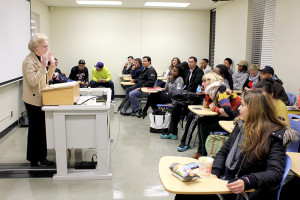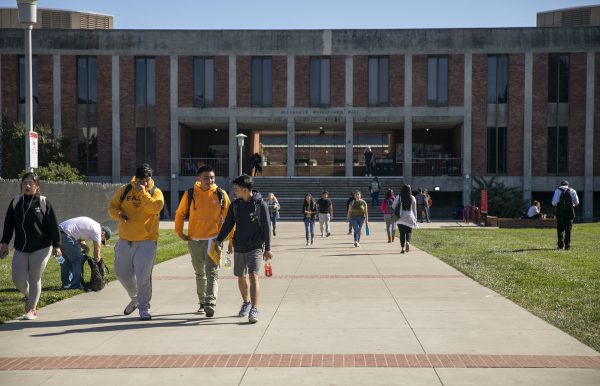CSU Trustees Look to Speed Up Graduation Day

the first day.
The California State University Board of Trustees has voted to reduce the number of units required to graduate, a move that it hopes will save money and move students through the CSU system more quickly.
This comes after Governor Jerry Brown released his 248-paged budget proposal for the 2013-14 fiscal year, which instructs the state to put an extra $125.1 million into the CSU system.
The idea behind the reduction is to condense the amount of time students spend at college by deterring them from taking unnecessary classes, according to Brian Ferguson, California Faculty Association communications specialist.
“Last fall there was a proposal where they were going to charge students fees for any units taken over 120 units (180 quarter units for quarter system),” said Ferguson, Another idea was to eliminate requirements for upper division general education classes, which met much opposition from faculty members.
“So, what they did at this last meeting is pass a proposal that wasn’t aimed at fees so much than at streamlining the amount of units required,” said Ferguson.
According to Ferguson, the CFA is well aware that students take extra units for many different reasons. Whether it’s for lack of classes or a changed major, Ferguson says students want to get in and out as quickly as they can and get into the workforce.
Erik Fallis, CSU media relations manager, says the committee’s new policy should be looked at in a positive light, especially for students. Decreasing the number of units required to graduate, according to Fallis, actually heightens access to the state universities for a greater number of students while also diminishing student costs.
“We’re trying to change that campus culture that automatically believes that a four-year completion of a degree is the exception instead of the standard,” said Fallis.
“More than two-thirds of the remaining students would save an average of five credits (during their college career), going from 125 or 126 to 120 credits,” according to the board’s agenda. “For most of these students, that represents one part-time, extra term at current tuition about $2,200 per student or $4.5 million total.”
Dianne Harrison, president of CSU Northridge said in the board meeting that her university could save “about $1.66 million in aid to students,” as stated by the agenda. She says that this could not only lower costs, but allow 415 new students to access education at her school.
The agenda says the president supports the vote saying, “it reduces costs for students, makes additional financial aid funds available to more students and increases access.”
Kim Geron, CSU East Bay Political Science Department Chair and CFA vice president said, “There should be a better process.” He mentioned the system is convoluted and the processes of divvying up the course work is unclear.
Trustee Bernadette Cheyne was the only member to vote against the proposed changes, stating that the process should be delayed due to lack of time to properly implement such a policy.
For CSU East Bay and other campuses on the quarter system, it remains to be seen what the impact of the changes will be.
Senior Director of Undergraduate Students and General Education, Dr. Sally Murphy, says most majors on the CSUEB campus are under or at 180 units in terms of the requirements for students.
“Most majors on this campus range from anywhere between 45 units to 108 units,” said Murphy. “Every year me and a staff member from CSUEB’s Academic Programs and Graduate Studies department go through the CSUEB course catalog and count up the number of units there are in each major, and see how many majors are at or above the 180 unit limit.
“We want to see what the real impact is on students when we do that count, and there are very few units on this campus that require more than 180 units,” said Murphy. “For example, the nursing department is really working hard right now to bring their units down to 180, seeing as the department’s degree requirements don’t give the it much leeway.”
Although the board’s decision doesn’t give bachelor degree-seeking students much flexibility to explore other areas of interest, Murphy feels the decision seems fair for students.
“It’s just fair advertising. It’s saying that if we say you can get your degree in 120 units, we ought to be able to deliver upon that,” said Murphy. “I’ve seen students who have been here since the 1980s who have been going here this whole time because they can only take one course a quarter and that leads to a very long road to graduation.”
According to Brown’s budget summary, in order to determine which majors will be extended, “Priority will be given to the development of courses that serve greater numbers of students while providing equal or better learning experiences.”
Murphy explains that as a university, the CSUEB faculty needs to really look hard at that balance between what is essential in the major and what is not essential, so that we honor what we tell students the degree is going to cost them in terms of units and in terms of money.
“We’re not very good at the money, we keep raising the fees and tuition, so at least let’s keep the units under control,” said Murphy.
The board plans to implement their new plan by fall of 2014 and will be meeting on June 15 to discuss further plans.
Keely Wong contributed to this article.














